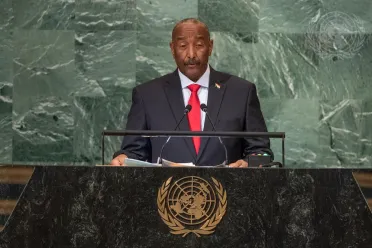Statement
Statement summary
ABDEL-FATTAH AL-BURHAN ABDELRAHMAN AL-BURHAN, President of the Transitional Sovereign Council of Sudan, shared his country’s political developments, including its commitment to a peaceful transition, establishment of a real democracy, and free and transparent elections. The end of that transition period will culminate in a civilian regime representing all Sudanese people. In addition, it was decided in a recent communiqué that the military institution would withdraw from that dialogue and that the revolutionary political forces would be allowed to form a civilian Government that would implement the rest of the requests from the transition period. Reiterating his commitment to cooperate with the United Nations Integrated Transition Assistance Mission in Sudan (UNITAMS) and its mandate set forth by the Security Council, he affirmed that cooperation would continue with UNISFA.
He welcomed public dialogue during the transition period, particularly with youth, community leaders and signatories of the Juba Peace Agreement, noting that such talks would foster national unity. However, though progress had been made, thanks to the tripartite mechanism led by UNITAMS, the Intergovernmental Authority on Development (IGAD) and the African Union, the mechanism did not conclude, he said, noting that this made debates on national consensus complicated. Following the December revolution, the Juba Peace Agreement was signed, calming conflict in Darfur and increasing stability in the region. He called upon Abdul Wahid Al Nur and Abdel Aziz al-Hilu to join the “caravan of peace”. He also highlighted community reconciliation and the increased rate of voluntary return of civilians to Darfur.
Sudan continues to rise to challenges in the region, he continued. Some achievements included a peace agreement with South Sudan; cooperation with the Government of Somalia; the coordination of a peace agreement in the Central African Republic; and participation in meetings to promote peace in the Democratic Republic of the Congo, to name a few. Noting progress on efforts to achieve the Sustainable Development Goals, the Government adopted a strategic document to reduce poverty between 2021 and 2023. However, he pointed out that Sudan’s progress is limited by external debt. He urged the international community to honour the commitments made in Paris in 2020 and Berlin in 2021, especially in the context of soaring food and energy prices. He also asked for help through the transferring of agricultural technology, capacity-building and the support to build a centre of agricultural research. Though a country of limited resources, Sudan now hosts 4 million refugees from across the continent and he called on the world to remember its duty to provide humanitarian assistance.
Spotlighting other projects on the horizon, he said that Sudan will prioritize disarmament with a focus on combatting the proliferation of small arms and light weapons. Like all developing countries, Sudan is suffering from this scourge which has only been made more complicated through competition over water, pastoral and mineral resources. He also underscored that he supported the African position on Security Council reform. It is through this reform that Sudan, like other States, wishes to address negative practices such as “unilateral wording and the hegemony of penholders”, he said.
Full statement
Read the full statement, in PDF format.
Photo

Previous sessions
Access the statements from previous sessions.
